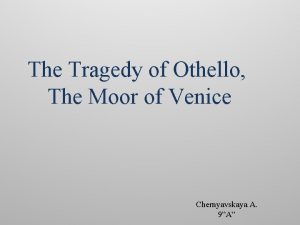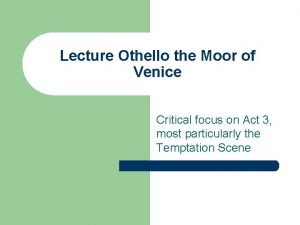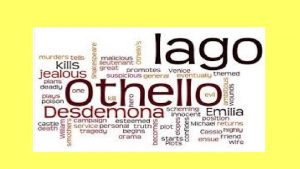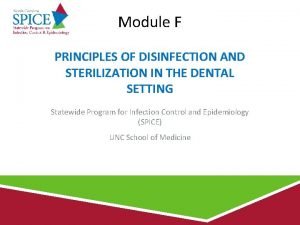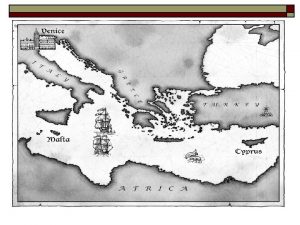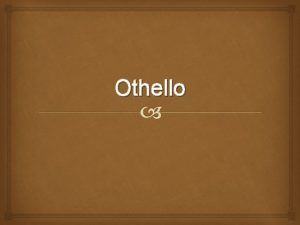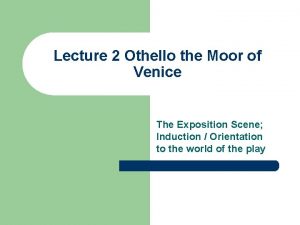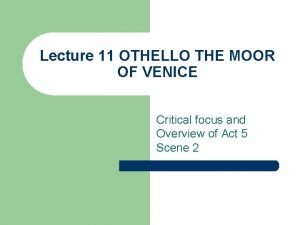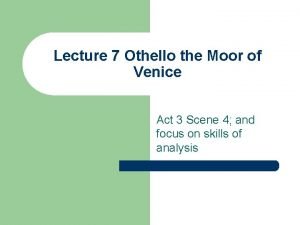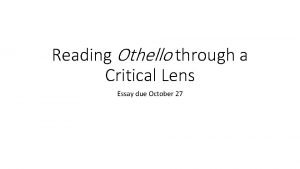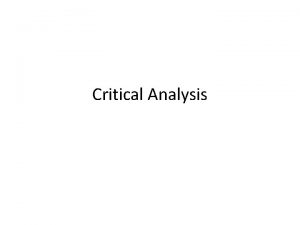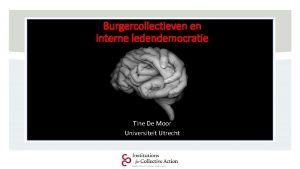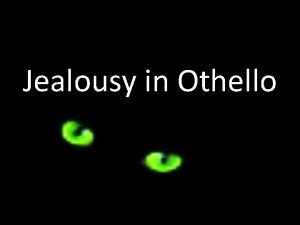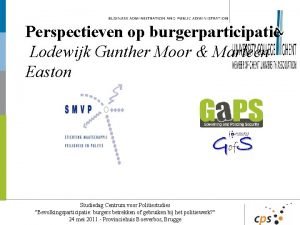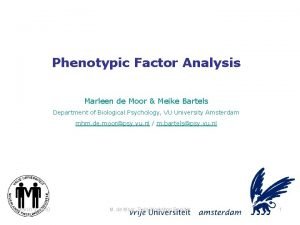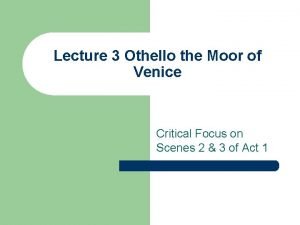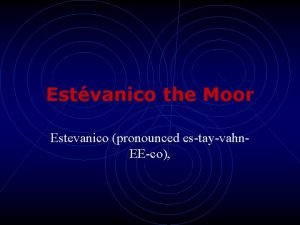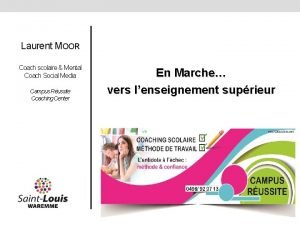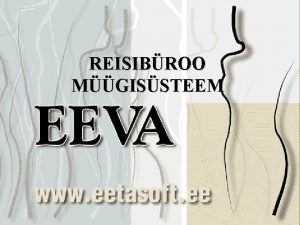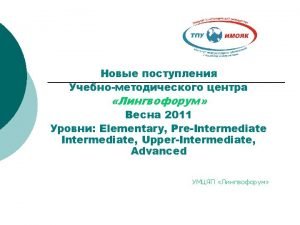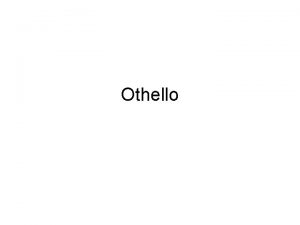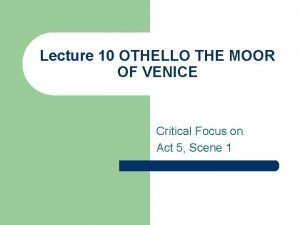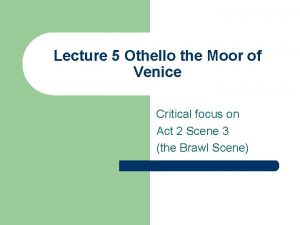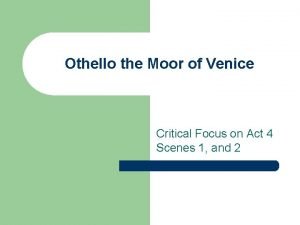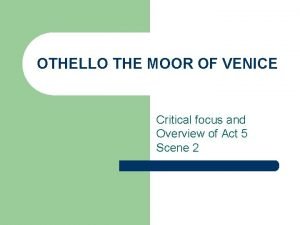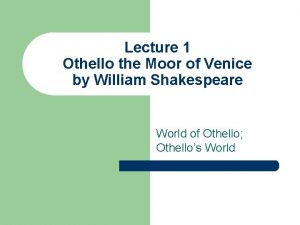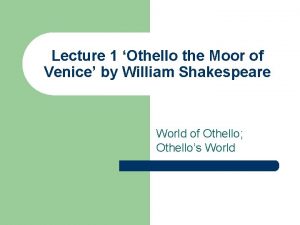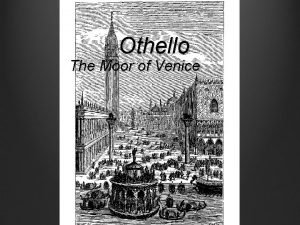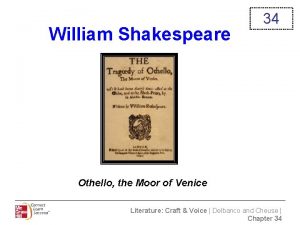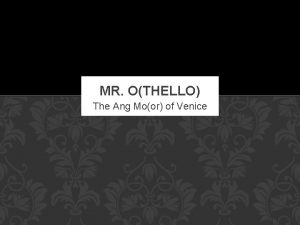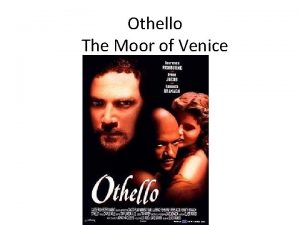Lecture 3 Othello the Moor of Venice Critical






























![Scene 3 stresses Othello’s greatness as a public figure [dramatic effects? ] l l Scene 3 stresses Othello’s greatness as a public figure [dramatic effects? ] l l](https://slidetodoc.com/presentation_image_h/ce5bea04ffecf91c555f96d59323d7e7/image-31.jpg)










- Slides: 41

Lecture 3 Othello the Moor of Venice Critical Focus on Scenes 2 & 3 of Act 1

Examination Information for you!!! 1) Study up to Act 2, Scene 2 (Re- Othello) l 2) ‘Collapsed’ Papers 1 and 4 H 1 Two hours duration l One compulsory Othello context question plus l One ‘Unseen’ Comparative Poetry question H 2 Three hours: Othello, ‘Unseen’ Poetry l Plus a question on Brave New World l

Sources of conflict? l l l A ravishingly beautiful, drop dead gorgeous, super sexy looking woman Money matters The presence of an outsider, ethnically and culturally different and distant A suave and debonair young man Sexual desire; and lust

Sources of conflict (cont) l l l Mixed marriage Mother nature’s disproportionate distribution of Intelligence and Stupidity; of Superior and Inferior intellect; of the Strong and the Weak Grievances Bad judgment Temptation

Desdemona’s declaration of faithful love for the Moor in Act 4, Scene 2 I know not how I lost him. Here I kneel: If e’er my will did trespass ’gainst his love, Either in discourse of thought or actual deed; Or that mine eyes, mine ears, or any sense Delighted them in any form; Or that I do not yet, and ever did, And ever will—though he do shake me off To beggarly divorcement—love him dearly,

Comfort forswear me! Unkindness may do much, And his unkindness may defeat my life, But never taint my love. I cannot say ‘whore’; It does abhor me now I speak the word; To do the act that might the addition earn Not the world’s mass of vanity could make me.

Dramatic purposes of Act 1 Scene 2 l l l l To present the audience with a close-up picture of the Moor, Othello To establish Othello’s position as a military leader To shed more light on the character of Iago To advance the movement of the play To arouse excitement of a possible arrest (suspense) To continue theme of Magic—the black arts To link up with Scene 1

Close-up picture of Othello l l l Othello a romantic figure & of royal lineage Exceptionally conscious of his worth Trusts in friendship; not given to suspicion Has respect for age: ‘command with years’ No weakling; no wimp Fearless: “Keep up your bright swords, for the dew will rust them”

Othello as a military leader in this scene l l l Presented / portrayed to be an alert, poised leader Proud but not vainglorious Convinced of his own integrity And trusting the integrity of others Single-minded and dedicated to duty Such a man is fit to be a leader

Note the Moor much different than Iago’s description of him in Scene 1 l l l His first long speech stresses that difference His dignity, pride, self-confidence are shown However we also learn that the Moor became a husband with some regret Only the strength of Desdemona’s love strong enough to make him want to give up his bachelor freedom for marriage Thereby subtly hinting future conflict

Critical questions to ask oneself re- Othello l l l Now what is your opinion of Othello? What may have brought about his ultimate downfall? Is he simply a victim of the villainous schemes of Iago? Or is there apparent some serious defect of character that made his downfall possible? Such as being, too credulous? Should he have been more cautious, more alert?

More light on IAGO Note Iago’s pretended restraint l Cleverly insists on the enormity of Brabantio’s provocation: “prated, And Spoke such scurvy and provoking terms Against your honour” l Tries then another way to get Othello angry: “he will divorce you, Or put upon you what restraint, and grievance. . l

Critical questions to ask re- Iago l l l Is his sense of unrewarded merit an important key to his attitude and action? Is he a relatively decent man plunging for the first time into wickedness? Or is he sick, disturbed, neurotic? Sees people merely as objects to exploit? Is like Satan seeking absolute mastery?

Iago in Scene 2 in contrast to Scene 1 l In scene 1, Iago seemed to be interested only in his own material gain l In Scene 2, he seems to have one fixed idea: to avenge himself on the Moor.

Advancing the movement of the play l l l In Scene 1 what dominated the action? Brabantio’s grief at the loss of his daughter And in Scene 2? Introduced is national strife and the invasion of Cyprus. So the tempo of the scene at once increases in speed.

Increase in tempo evident in: l l l Duke requires the appearance of Othello “haste post haste” “even on the instant” News from Cyprus “is a business of some heat” “the galleys // Have sent a dozen sequent messengers // This very night, at one another’s heels. ”

The government has been called to the council chamber: “many of the consuls, rais’d and met, Are at the duke’s already” l The request for Othello is emphasized again: “you have been hotly call’d for” “The senate sent about three several quests To search you hot. ” l

Excitement of a possible arrest A torchlight procession is to be seen approaching l Our minds jump to the conclusion an arrest is about to be made l Iago’s remarks add to the excitement: The lights he says are those of “the raised father and his friends” l

Advises and urges Othello “You were best go in” l But Othello remains calm; refuses to hide l Procession comes nearer; l And we are prepared for a confrontation and conflict —but l Tension eases—why? l It is his lieutenant Cassio & officers of the Duke l

Approach of mob violence l l l But there is more movement More lights in the distance A torchlight procession in noisy hot pursuit Led by Brabantio and Roderigo And Iago again is on the alert; again he warns Othello: “general be advis’d // He comes to bad intent”

l l l Swords are drawn And the followers on both sides prepare to fight Brabantio calls to his men to tackle the Moor “Down with him, thief” Clash of swords can be seen and heard Note Iago is in the struggle too

l l l But Othello manages to keep his cool Stays in command of the situation With an air of authority he orders both parties to: “keep up your bright swords” So the conflict has been averted But the excitement of it gives thrilling dramatic value to this scene.

Theme of Magic; of Occult powers; of Witchcraft; the Black Arts l l l Shakespeare’s tragedies deal with things greater than man With otherworldly powers; with the dark abysses of suffering First and foremost Shakespeare is a poet A gift for the imagination In his true poetic imagination—he knows how slender a hold man has on this life

l l And how changeable are his quiet orderly habits and his prosaic speech At any moment by the operation of chance or of fate The quiet of our everyday normal lives may be disturbed And the world is given over once more to forces beyond our control

Throughout Scenes 1 & 2 of Act 1 We get the feeling that fate, chance, charms and witchcraft are at work l Sc 1 B hears that Desdemona has eloped. His first thought—how she got out? l A horrible thought strikes him—charms, witchcraft, are at work in his own home “is there not charms” abusing “the property of youth and maidhood” l

Theme of Charms developed in Scene 2 l l Brabantio accuses Othello of being “an abuser of the world, a practiser // Of arts inhibited, and out of warrant” He cannot accept the possibility that she left home of her own free will And because of her love for Othello This theme is weaved into the texture of the drama almost unobtrusively

“hast practis’d on her with foul charms, Abus’d her delicate youth, with drugs or minerals, That weakens motion. ”

Dramatic purposes of Scene 3 l l l To create the atmosphere of war To make clear the stature of Othello To explain the romantic background to the love between Othello & Desdemona To give glances at the characters of Roderigo and Brabantio To give birth to Iago’s monstrous plot To shed more light on Iago’s character

Stature of Othello l l l As Othello makes his entrance in the company of others notably Brabantio Duke sees only one person: “the valiant Othello”. The dramatic significance being? Thus we note how the Duke makes it a point to greet Othello before welcoming Brabantio

Dramatic implications l l Reflects the uncertainty and disordered atmosphere of the situation and even of the council chamber itself It subtly forecasts the Duke’s judgment in favour of Othello when Brabantio accuses him of witchcraft
![Scene 3 stresses Othellos greatness as a public figure dramatic effects l l Scene 3 stresses Othello’s greatness as a public figure [dramatic effects? ] l l](https://slidetodoc.com/presentation_image_h/ce5bea04ffecf91c555f96d59323d7e7/image-31.jpg)
Scene 3 stresses Othello’s greatness as a public figure [dramatic effects? ] l l Adventurous background has stirred the whole Venetian state to admire him But it is his public image of discipline and self-control that makes most appeal So far in the play he shows himself as a man of cool head and cool decision We note—allows Brabantio to state his case without interruption; he listens as Brabantio accuses him publicly of abusing, corrupting Desdemona “by spells and medicines”

In reply he shows great diplomacy l Knows that to contradict Brabantio openly would only arouse hostility and so he offers to subtly explain the nature of this magic: “she lov’d me for the dangers I had passed And I loved her that she did pity them This only is the witchcraft I have used” l

l l l Effects of this diplomatic speech? Such diplomacy wins the sympathy of the Duke and his senators Note: He does not degrade Brabantio for the accusation he makes; he shows he recognizes the legitimate right Brabantio has as the father of Desdemona Wisely then he states his own case clearly and directly

l l He describes openly and truthfully the events before marriage How he was a guest in Brabantio’s house; How he narrated his past adventures That this romantic background won (charmed) Desdemona’s pity and love; not any form of witchcraft

Language of Othello’s speech Language is in keeping with a man of stature l It is eloquent though he says he is rude of speech “Most potent, grave, and reverend signiors, My very noble and approved good masters” l It is the language of respect l And in return it wins respect for his point of view l

So note next time how to address and get the right side of Mr David L. Fahy “Most potent, grave, and reverend sir, Mr. Fahy My very noble and approved good master. ”

Note the syntactic rhythms of Othello’s speech Othello here speaks in continuous, articulate and reasoned structures l Very measured, steady, and controlled As opposed to l Fragmented, loose, emotional structures l

Iago’s monstrous plot is born; We listen to his soliloquy Seems to know Othello’s character better than he knows it himself “The Moor a free and open nature too, That thinks men honest that seem to be so: And will as tenderly be led by the nose… As asses are. ” l

Ending with powerful and arresting imagery: “Hell and night Must bring this monstrous birth to the world’s Light” l Ends with a forecast of doom to the idealistic lovers l And the destruction of an unsuspecting couple [Note the dramatic irony] l

Do you find Iago puzzling? Does Iago come across as an ordinary villain? l Does he delight in evil because it is evil? l Charles Lamb in his Elia Essays he is “a consummate villain entrapping a noble nature into toils. ” l And William Hazzlit says there is a lack of motive behind his dastardly behaviour. l What, CJC students, is your opinion of Iago? l

Themes in Scenes 2 & 3 of Act 1? Act 1 Scene 2 l Magic; Witchcraft l Appearance and Reality l Good versus Evil Act 1 Scene 3 l Magic; Witchcraft l Love and Hate l Appearance and Reality l Good versus Evil
 The moor of venice
The moor of venice Foreshadowing othello
Foreshadowing othello Othello moor meaning
Othello moor meaning Critical semi critical and non critical instruments
Critical semi critical and non critical instruments Semicritical
Semicritical Venice cyprus othello map
Venice cyprus othello map Stylometry
Stylometry Degrees of lewdity moor
Degrees of lewdity moor Othello dramatis personae
Othello dramatis personae Othello lecture
Othello lecture Othello lecture
Othello lecture Othello lecture
Othello lecture Othello lecture
Othello lecture 01:640:244 lecture notes - lecture 15: plat, idah, farad
01:640:244 lecture notes - lecture 15: plat, idah, farad Othello critical lens essay
Othello critical lens essay Critical reading meaning
Critical reading meaning Tine de moor
Tine de moor Othello jealous
Othello jealous Marleen de moor
Marleen de moor Chafford hundred medical
Chafford hundred medical Othello annotations act 1
Othello annotations act 1 Marleen de moor
Marleen de moor Heaton moor medical centre opening times
Heaton moor medical centre opening times Presentiago
Presentiago Saint james the moor slayer
Saint james the moor slayer Bart de moor
Bart de moor Othello act 1 summary
Othello act 1 summary Estevanico the moor
Estevanico the moor Laurent moor
Laurent moor Andrus moor
Andrus moor Cutting edge peter moor
Cutting edge peter moor Oege de moor
Oege de moor Act 2 othello summary
Act 2 othello summary Cách giải mật thư tọa độ
Cách giải mật thư tọa độ Các châu lục và đại dương trên thế giới
Các châu lục và đại dương trên thế giới Từ ngữ thể hiện lòng nhân hậu
Từ ngữ thể hiện lòng nhân hậu Bổ thể
Bổ thể Tư thế ngồi viết
Tư thế ngồi viết Ví dụ giọng cùng tên
Ví dụ giọng cùng tên Thể thơ truyền thống
Thể thơ truyền thống Hát lên người ơi
Hát lên người ơi Sự nuôi và dạy con của hươu
Sự nuôi và dạy con của hươu
